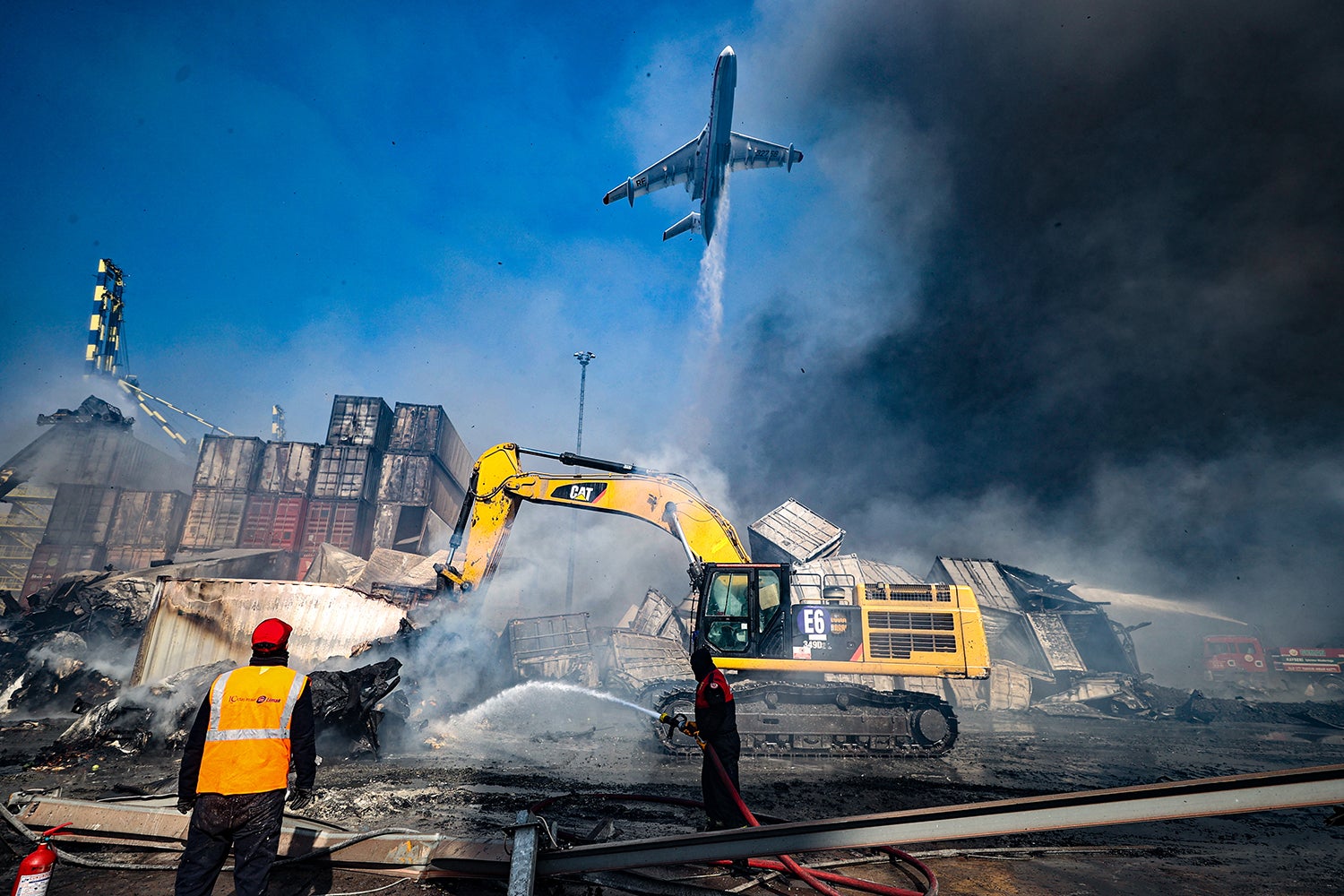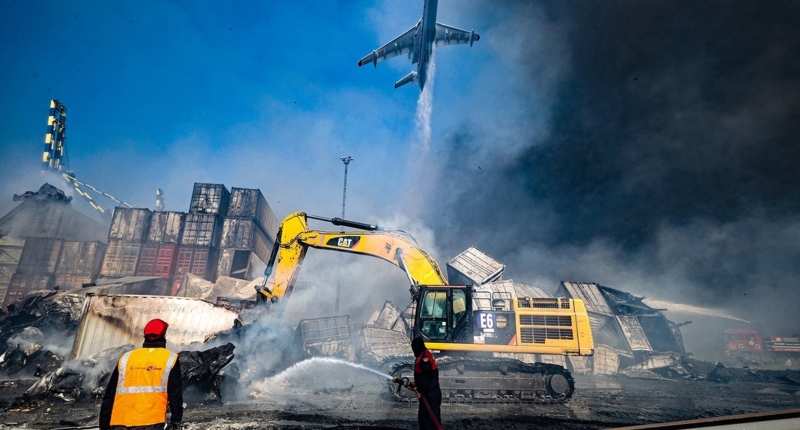The aviation industry played a significant role in facilitating humanitarian aid efforts in response to the Turkey-Syria earthquakes. Airlink and Chapman Freeborn provided free air transport for responders and air cargo space for NGOs to deliver aid to affected communities. Transport costs account for 73% of the average cost of a humanitarian aid program, and many NGOs do not have specific logistics budgets or dedicated logistics teams. Clean drinking water is a key concern in the aftermath of the earthquakes, and the aviation industry’s willingness to answer the call to care for others is inspiring. As priorities shift and new challenges arise, there will be a considerable need for humanitarian aid for some time to come, likely well into 2024 and beyond.
Aviation’s Humanitarian Aid Efforts in Response to Turkey-Syria Earthquake

On 6 February 2023, Turkey experienced a devastating 7.8 magnitude earthquake near its border with Syria, followed by another earthquake of similar strength. Just two weeks later, a third 6.3 magnitude earthquake hit southern Turkey, causing massive destruction and loss of life. The Disaster Emergency Committee reports over 50,000 people have died, 214,000 buildings have been damaged or destroyed, and over 18 million people have been impacted, with many urgently needing food, shelter, and medical aid.
Amid this humanitarian crisis, aviation has played a significant role in facilitating aid efforts. Airlink, a non-profit disaster response organization that coordinates and transports responders and humanitarian aid, has provided free air transport and cargo space to over 150 non-governmental organizations globally. Steve Smith, Airlink President and CEO, explains that Airlink is a demand-led organization that fulfills the needs of NGOs for transport, ensuring that transport costs are not a barrier to responding to disasters.
Within hours of the call for international assistance by the Turkish and Syrian authorities, Airlink activated its regional response plan, which forms the nucleus of a coordinated response involving airlines, donors, and NGOs. Airlink facilitated the deployment of search and rescue teams and specialized disaster response personnel within 48 hours, while continuing to support the transport of responders and aid.
Aviation companies have also provided support, with Turkish Airlines sending a cargo plane carrying 48 tons of food and aid supplies to Hatay. Additionally, Lufthansa Technik’s aircraft engine maintenance facility in Istanbul provided free maintenance support to disaster relief organizations operating in the region. These efforts demonstrate how aviation has come together to support the humanitarian needs of those impacted by the Turkey-Syria earthquakes.
In conclusion, the aviation industry has played a crucial role in providing humanitarian aid efforts in response to the devastating earthquakes that struck Turkey. With organizations like Airlink facilitating the transport of responders and aid, and aviation companies providing support and resources, the response to this disaster has been facilitated and coordinated. The collaborative efforts of the aviation industry have helped alleviate the suffering of those impacted by this tragedy.
Aviation’s Humanitarian Role in Response to Turkey-Syria Earthquake
The role of aviation has been critical in facilitating humanitarian aid efforts in response to the Turkey-Syria earthquakes. NGOs, aviation companies, and non-profit organizations have come together to ensure the timely and efficient delivery of aid to affected communities.
Airlink’s Support
Airlink, a non-profit disaster response organization that coordinates and transports responders and humanitarian aid, provided over 173 responders with flights in February and March. It also moved over 730 tonnes of humanitarian supplies and still has over 290 tonnes in the pipeline. Airlink needs donations to transport this aid to those in need.
In addition to transporting aid, Airlink sent a team of ten search and rescue and medical volunteers for its NGO partner CADENA. This team saved two lives and provided over 3000 hours of volunteer service to communities in Turkey.
Chapman Freeborn’s Emergency Response
UK-based global air charter specialist, Chapman Freeborn, activated its emergency response team within hours of the earthquake to support the efforts of its clients. The team looked into the best airports in Turkey and Syria to support its clients, contacting Civil Aviation Authorities and ground handling companies.
Chapman Freeborn’s team coordinated its onward passage, navigating Syria’s embargoes and closed borders to ensure that the aid reached the people who needed it most. The team gained the necessary land permits, flyover rights, and approvals from the Syrian Civilian Aviation Authority and the Syrian Ministry of Foreign Affairs.
The company has operated over 45 flights for cargo, as well as multiple flights for various government emergency response teams, resulting in thousands of tonnes of aid reaching the population.
“To date, our airline partners supported us and kept pricing very low due to the emergency situation, and our parent company Avia Solutions Group donated financial support,” says Neil Dursley, CCO at Chapman Freeborn. “I believe there is no more supportive industry than aviation.”
A Change in Needs
As priorities shift and new challenges arise, there will be a considerable need for humanitarian aid for some time to come, likely well into 2024 and beyond. Aviation companies and non-profit organizations will continue to play a crucial role in ensuring the efficient and timely delivery of aid to affected communities.
In conclusion, the aviation industry has played a significant role in facilitating humanitarian aid efforts in response to the Turkey-Syria earthquakes. The collaborative efforts of NGOs, aviation companies, and non-profit organizations have ensured that aid reaches the people who need it most. As the need for humanitarian aid continues, the aviation industry will continue to play a vital role in facilitating the delivery of aid.
Transport Costs Account for 73% of Humanitarian Aid Programs
Transport costs account for 73% of the average cost of a humanitarian aid program. This includes the cost of moving search and rescue teams, winter kits, tents, and clean drinking water to affected communities. According to Steve Smith, President and CEO of Airlink, many NGOs, especially smaller ones, do not have specific logistics budgets or dedicated logistics teams. As a result, there is no pot of money to support transport costs from governments or foundations.
For example, in response to the crisis in Ukraine, one organization received a generous donation of 116,000 pairs of winter boots, which would cover about 25% of the total need in Ukraine. However, they did not have the budget to fly the shipment, and sending it by sea would miss the winter deadline. They turned to Airlink for support.
Aviation companies play a vital role in aid delivery, providing free air transport in the form of tickets for responders and air cargo space to a network of 150 NGOs globally. Airlink’s aviation partners are crucial, and without their support, they couldn’t achieve any of what they do.
Clean drinking water is a key concern in the aftermath of the Turkey-Syria earthquakes. It is vital for preventing the spread of waterborne diseases, which can devastate populations and impact children acutely. As the need for humanitarian aid continues, the aviation industry’s willingness to answer the call to care for others is inspiring.
Don’t miss interesting posts on Famousbio










